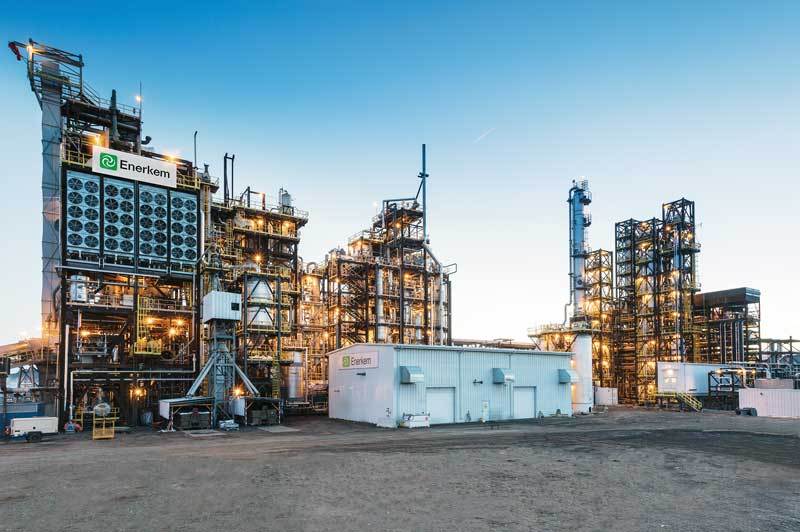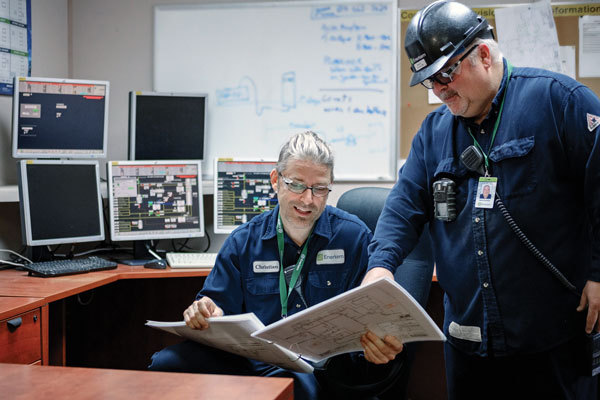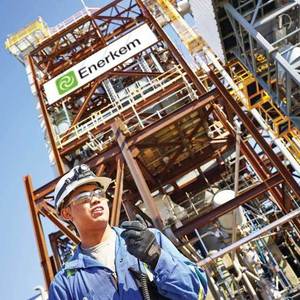Running on Refuse




May 14, 2019
BY Matt Thompson
A Canadian company is furthering ethanol’s environmental benefits, using municipal solid waste (MSW) as a feedstock. Enerkem’s production facility in Edmonton, Alberta, has produced methanol for about four years, but added ethanol to its offerings in 2017. “Our product is in high demand, given that it provides more benefits from an environment standpoint and it also sells at a premium in several markets,” says Michel Chornet, Enerkem’s executive vice president of project execution and plant operations.
“Enerkem’s disruptive technology can help address these pressing environmental issues and fulfill the growing demand for greener products or a ‘cradle-to-cradle’ solution in consumer products,” Chornet says. “It takes waste less than five minutes to produce a synthetic gas, and converts it into advanced low-carbon transportation biofuel—enough to fuel over 400,000 cars on a 5 percent ethanol blend. In turn, biofuels also help reduce greenhouse gas (GHG) emissions by approximately 60 percent when compared to traditional fossil fuel production and landfilling.”
Other companies use MSW, but Chornet says, “We believe that in terms of scale-up, in terms of how far we went, we believe that we’re farther or we’re leading the pack.” He adds that Enerkem’s Edmonton plant is the largest MSW-to-ethanol plant, with the capacity to produce 38 million liters (10 million gallons) of methanol and ethanol each year.
Capturing Carbon
The city of Edmonton provides Enerkem the sorted MSW.
Chornet says the thermochemical process used by Enerkem in gasification differ from the biochemical processes in corn ethanol production in the temperatures, pressures and residence time achieved. In Enerkem’s process, temperatures and pressures are relatively low.
In addition, Chornet says, Enerkem’s feedstock provides additional challenges. Because corn starch is a fairly homogenous feedstock, it lends itself to fermentation. “Waste is a heterogeneous feedstock bringing its own challenges,” he says. “However, waste materials are rich in carbon content, as they are comprised of non-easily compostable biogenic materials as well as non-practically recyclable fossil-based materials (plastics), the latter being very difficult to decompose using enzymes or microbes.” And it’s that carbon Enerkem’s process is designed to capture, through gasification of the feedstock.
“In the gasifier, waste is decomposed to simple molecules, predominantly hydrogen, carbon monoxide, as well as carbon dioxide,” Chornet says. “The conversion reactions require oxygen and steam.” After the syngas is produced, impurities such as chlorides are removed, Chornet says. “We have to clean the gas from contaminates that are typically present in the waste.”
The syngas, which Chornet describes as an intermediate, is then converted into methanol, and then ethanol. “Once we have this intermediate, roughly half of the syngas is converted into methanol,” Chornet says. He adds that if methanol is the final product, it’s distilled to become chemical grade.
“If ethanol is the desired product, the methanol is further converted into ethanol through a two-step catalytic process,” he says.
Chornet says producing methanol is a crucial step in the production of ethanol. “We wanted to first produce clean syngas and we produced methanol,” he says. “Methanol is an intermediate to produce ethanol; it’s required.” Methanol is a platform chemical for Enerkem, he adds, as the company has several other projects producing it, mainly in Europe.
Bigger Picture
More than half of the MSW generated globally every year still ends up in landfills, despite composting and recycling efforts, according to Enerkem. And Enerkem’s role in helping reduce landfill waste and GHG emissions is important, Chornet says. “Waste management is highly likely to be top of mind of many environmental groups, as it indeed is part of the bigger picture of GHG emissions and climate change.”
The Netherlands is one country that’s stepping up to manage its waste more efficiently. According to Enerkem, a majority of the Netherlands’ residual waste is burned. Turning that waste to methanol through Enerkem’s technology will help the country meet its climate goals.
Enerkem is part of a consortium working on a plant in Rotterdam in the Netherlands, which will produce methanol. “We’re doing this plant with industrial partners,” Chornet says, naming the Port of Rotterdam, specialty chemicals company Nouryon, industrial gas and service supplier Air Liquide, and Shell.
He adds that most of the detailed engineering for the plant is complete, and work will soon begin on financial closing. “We’re looking at beginning the procurement of long lead-time items in 2020, so next year,” he says.
And following the success of Edmonton’s plant, and the potential success of the Rotterdam plant, Chornet says Enerkem’s vision is being realized. “I don’t know about closing down landfills because there’s a lot of waste, but it’s been our vision to try to valorize the carbon that is being basically put to sleep in the landfills,” he says. “Also, in Europe, there’s a big movement around circular economy for plastics. Plastics have more difficulties to being recycled and with methanol and ethanol, you can get into the plastic recycling also.”
Chornet says the company currently only produces methanol and ethanol. But in the future, that might change. “We have an research and development group that’s looking at getting into some higher-value products, but right now, our commercial platforms are either methanol or ethanol,” he says.
Enerkem’s research and development team last year produced a renewable bio-dimethel ether, which it says could replace diesel in the transportation sector. It also produced a new biofuel that might help improve octane ratings in conventional gasoline.
Innovation in Edmonton
Part of the reason for the plant’s success, Chornet says, is the collaboration with the city of Edmonton. “Edmonton is quite unique because they had a vision and they were advanced quite a bit into their vision,” he says. “In other places of the world, the waste is more handled by private companies.”
The Edmonton plant was built with the help of Alberta Innovates, a government entity focused on assisting in business endeavors. “We’re a provincially funded corporation and our mandate is all about innovation,” says Candice Paton, executive director of Alberta Innovates’ clean technology business line. “It’s finding solutions for some of the most pressing challenges that we see in Alberta, all the way from the research side, through to industry.”
Alberta Innovates’ relationship with Enerkem began in 2005, Paton says. “They were looking to demonstrate their gasification technology at a commercial scale, and working with the city of Edmonton, Alberta Innovates and the Department of Energy really brought them here to this province to focus on the City of Edmonton and using MSW to convert to more valuable products like methanol and ethanol.”
Alberta Innovates provided some funding for Enerkem’s plant, which also helped build the Advanced Energy Research Facility, located at the plant. “That is a co-located, sort of plug-and-play facility where other innovators can come, including Enerkem, and it’s owned by the city of Edmonton, but it’s a place where you can have the availability of … gases and syngases and to demonstrate new technologies,” Paton says. “That’s been a really key part of how the Alberta Innovates support and funding and leadership in that place has brought more of an innovation approach and focus to those facilities.”
Diverting landfill waste also is a priority for Alberta Innovates and the city of Edmonton. “For a long time, we’ve had goals and targets around reducing waste to landfills and so that’s really why this is a key investment for Alberta Innovates over the last almost 15 years,” she says. “I think we’re hearing a lot more about the ideas around a circular economy and really understanding how products are moving throughout our supply chain and trying to start to recover value.”
“The city of Edmonton has a long-term commitment to environmental responsibility and sustainability,” says Ellen Tian, director of technical services in the Waste Services Branch of Edmonton. “Diverting as much MSW as possible from landfills is one of the goals. Enerkem’s technology supports this goal by converting MSW to fuel.” She adds that if the plant operates at its design capacity, it has the potential to divert up to 24 percent of the city’s MSW from the landfills.
According to Chornet, Enerkem is working with other municipalities in both the U.S. and Canada to build similar plants in other locations.
“I think this is really becoming an emerging area with a lot more enthusiasm to actually mitigate waste and create value,” Paton says. “This commercial-scale plant is quite exciting to have here in Alberta.”
Author: Matt Thompson
Associate Editor, Ethanol Producer Magazine
701.738.4922
mthompson@bbiinternational.com
Advertisement
Advertisement
Related Stories
Saipem has been awarded an EPC contract by Enilive for the expansion of the company’s biorefinery in Porto Marghera, near Venice. The project will boost total nameplate capacity and enable the production of SAF.
Global digital shipbuilder Incat Crowther announced on June 11 the company has been commissioned by Los Angeles operator Catalina Express to design a new low-emission, renewable diesel-powered passenger ferry.
Scientists at ORNL have developed a first-ever method of detecting ribonucleic acid, or RNA, inside plant cells using a technique that results in a visible fluorescent signal. The technology could help develop hardier bioenergy and food crops.
International Air Transport Association has announced the release of the Sustainable Aviation Fuel (SAF) Matchmaker platform, to facilitate SAF procurement between airlines and SAF producers by matching requests for SAF supply with offers.
Alfanar on June 20 officially opened its new office in London, further reaffirming its continued investment in the U.K. The company is developing Lighthouse Green Fuels, a U.K.-based SAF project that is expected to be complete in 2029.
Upcoming Events










